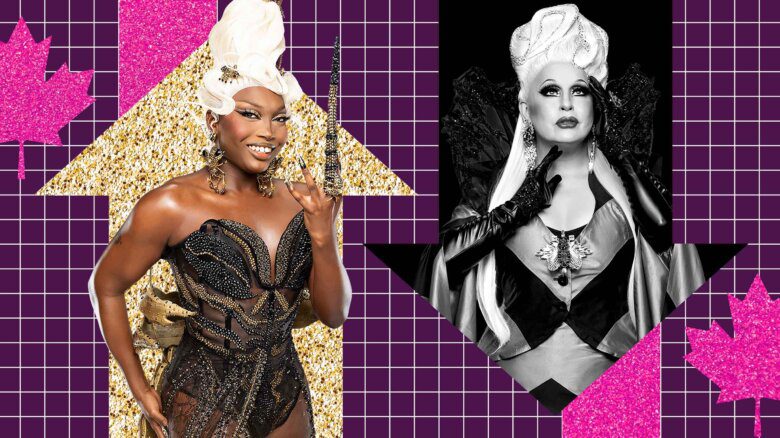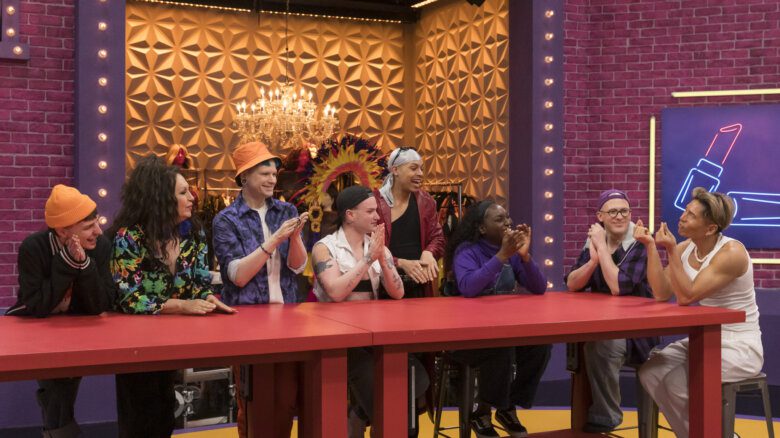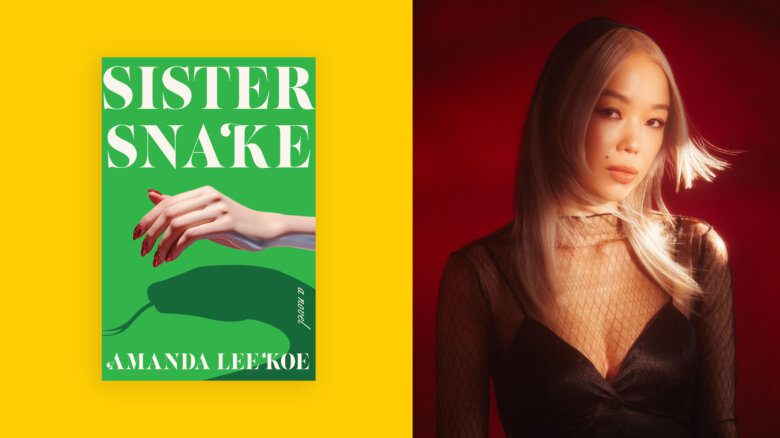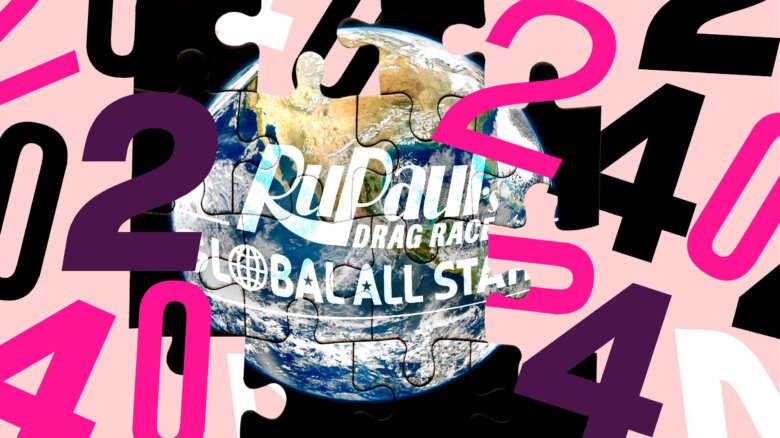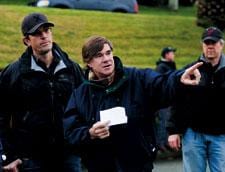
HISTORY LESSON. Director Gus van Sant says the story of Harvey Milk contributed to him coming out.
The film begins with our shame, and ends with theirs. The opening credits for Milk, Gus van Sant’s splendid and moving new film, play out over archival footage of police raids on gay bars and clubs (undated, but the “look” is very 1950s). Men try to hide their faces as they are led outside and stuffed into the backs of paddy wagons. Some sit disconsolately at tables, waiting for the police to process them, turning their faces away from the camera, veritable studies in the postures of shame. A glorious few make no attempt to hide. There is a hint of swagger in them.
By the mid-’70s those few have multiplied, have swelled into crowds of thousands, celebrating electoral and community victories in the city of San Francisco and, in 1978, mourning the deaths by assassination of the city’s mayor, George Moscone, and Harvey Milk, the first openly gay man elected to public office in the United States. Shame, by then, is rightly the province not just of Dan White, the elected official who killed both men, but of the secular theocracy that has deformed the American state and continues to do so to this day.
Harvey Milk (played by Sean Penn) did not make that gay movement happen — then, as now, that has been the work of legions of rather ordinary men and women who find the strength and inspiration together that they might not have been able to muster on their own.
Milk, though, was smart, energetic, empathetic, mouthy — able to seize the moment, inspire others, build coalitions and both guide and drive a movement that was burgeoning all around him. Still, as the film is at pains to point out, he was in many ways something of an ordinary guy himself. We meet him on the eve of his 40th birthday in New York, a businessman in a suit, picking up a cute young guy in the subway. He’s outrageously forward about it but, as he admits later in bed, he’s still in the closet in most ways. He feels he hasn’t done anything in his life he can be proud of. It’s a sweet scene — easy and natural, gently teasing in the way first-time bedmates can be.
Penn, homely hottie that he is, almost matches French actor Jean-Paul Belmondo in the beau laide sweepstakes. Scott Smith, the pickup who becomes his lover, is played by the much more conventionally handsome James Franco.
There is nothing cinematically daring about how the film unfolds, nothing of the van Sant of Elephant or Last Days. The straightforward, linear narrative (punctuated periodically by scenes of Milk dictating into a tape recorder the words he wants broadcast should he be killed in office) tracks him and Smith as they move to San Francisco in 1972, open a camera store in the Castro and become increasingly involved with politics both civic and gay.
Just a year later Milk will be cooperating with the Teamsters Union to ban the sale of Coors beer in Castro gay establishments (the Coors family is viciously anti-union and homophobic, even today). He will run for office at both the city and state levels, lose three times, finally win a seat at City Hall, battle the gay-hating initiatives of the odious Anita Bryant and John Briggs, and be shot to death in his city hall office by White, a fellow supervisor (the equivalent of an alderman) with whom Milk had clashed politically on several occasions (and whom Milk speculates might have been a repressed homosexual). Milk was just 48 years old.
Van Sant says he was still in the closet in the mid-’70s, and that he’d never heard of Milk until news of his assassination. The Milk story was partly an inspiration for his coming out — that, and “I gotta get laid,” he says, adding, “I was never an activist, and I can’t say that I am now. I’m more of a hermit artist.” Despite a continued fascination with outsiders, van Sant doesn’t characterize his films as political. “I don’t think so… though they’re challenging conventions of hero and anti-hero, and challenging what’s moral and immoral.”
The film Milk is thrillingly uplifting. You leave in tears. And though you weep for a vibrant life cut short, grief is far from the only reason you cry. You cry, really, because you’re exhilarated. You cry because an ebullient, loud-mouthed Jewish fag with nothing more behind him at first than a storefront business in a grotty part of town could help mould a community, change his own life and have an impact on the lives of thousands of others.
Cleve Jones was one of those others. The film’s historical consultant, he was a lippy 22-year-old in goofy glasses when he met Milk in 1976. His bratty insouciance is beautifully captured by actor Emile Hirsch. “Eerie, surreal, funny and sweet” is how Jones describes the experience of seeing his young self recreated on screen. “I really looked like that, with that hair,” he says, “that’s how I spoke, that’s how I danced, that’s how I was.” He also plays a cameo role in the film as another real-life activist and Milk supporter Don Amador.
Jones says “empathy” was Milk’s strength as a politician, “his ability to find common ground with people.
“I was very heterophobic at the time. I hated straight people and wanted nothing to do with them… but watching Harvey go to senior bingo nights or union halls and seeing him walk into a room where the tension was palpable and then make a quick, self-deprecating joke, and you’d see the shoulders coming down from the ears and people relax. Then you’d see Harvey, using very ordinary language, uncover the commonalities that exist among people who are used to seeing each other as very different.
“That was an accomplishment I have not seen equalled until this year, with Senator [Barack] Obama’s campaign.”
What struck me about Milk was his refusal to pander or moderate his message to accommodate the imagined sensibilities of a non-gay audience. He’s shown frequently at war with the gay establishment, personified in the film by David Goodstein (Zvi Howard Rosenman), owner and publisher of the gay magazine The Advocate, whose strategy is to downplay gay and talk up civil rights (a recurrent theme in gay history — I recall how, in Toronto after the 1981 bathhouse raids, there were voices arguing for calming down the gay community and against holding a demonstration). Milk would have none of that.
Van Sant thinks one of the reasons for the antigay marriage Proposition 8’s win in California is what he calls a “kinda quiet” campaign by the gay community, “like the one Harvey was against,” he says, “them not wanting to scare people with the word ‘gay.'”
The man from those jubilant ’70s who seems most to personify and perpetuate Milk’s politics is Jones. He cofounded the San Francisco AIDS Foundation in 1983 and in 1985 created the AIDS Memorial Quilt, described as “the world’s largest community art project.” He now works for Unite Here, an international union representing hotel, restaurant, casino, textile and garment workers, and is the author of a campaign he calls “Sleep with the Right People,” which encourages gay travellers to book into hotels that, “respect the rights of their workers.”
We spoke about what it takes to remain an activist. “Believe me,” Jones says, “I’ve made no sacrifices. I love what I do. It’s a lot of fun and it’s challenging and it’s always interesting… and the idea of a coalition between labour and gay people goes back to Harvey and the Coors boycott. At the end of the day, when we win, the housekeepers who clean your hotel room are going home with a bigger cheque and respect and, in this country, health insurance.”
We spoke, too, about the privilege at having been alive and young some 40 years ago when, as Jones puts it, “everything was brand new and so fucking exciting and we were all participating in something that had never been seen before on the planet. And it was driven by the sheer force of individuals’ personalities… before we became bureaucratized. Harvey would be a bit of an anachronism now… as am I.”
Nostalgia and romanticism aside, I think he understands the need for some bureaucracy (it would be difficult to work for a labour union otherwise). What he fears more is commercialization. “It’s really important,” he says, “to remind LGBT people that they are more than just a demographic subset to which products are marketed. We are a movement with roots in the radical social movements of the ’60s and if we don’t remember that I fear we’ll lose our moral authority.
“There is something unique about gay people. We’re perceived by almost everyone to be different, but we exist in every race, every ethnic group, every faith and because of that we have a responsibility to be the bridge builders, the ones who are always searching for that common ground.”
Milk couldn’t have said it better.
Milk opens Wed, Nov 26 in Toronto and Vancouver and Dec 12 in Ottawa.
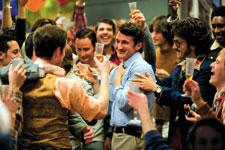
 Why you can trust Xtra
Why you can trust Xtra